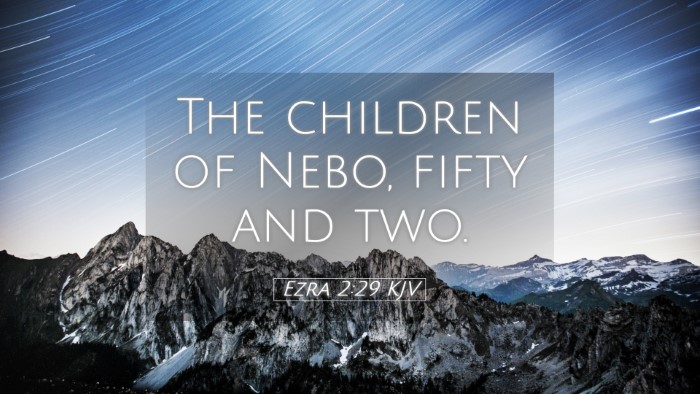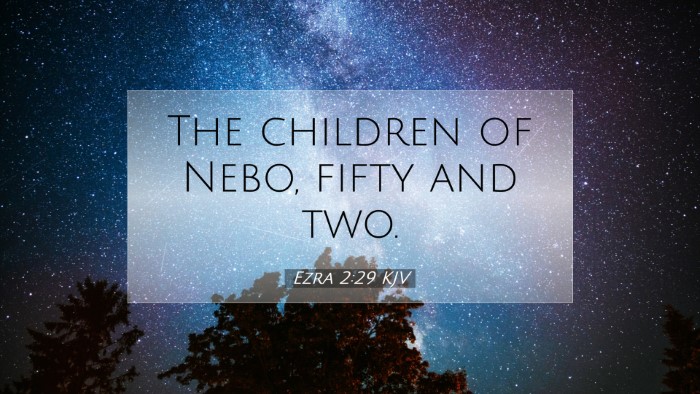Commentary on Ezra 2:29
Ezra 2:29: "The children of Nebo, fifty and two." This verse records the descendants of Nebo who returned from Babylonian captivity to Jerusalem. The mention of their numbers and lineage signifies the importance of ancestral heritage in the Jewish tradition.
Historical Context
The return from exile marked a significant moment in Jewish history. The Israelites had endured a prolonged period of suffering and separation from their homeland. Ezra, as a priest and scribe, played a pivotal role in leading this return and in re-establishing the Law of Moses among the people. The listing of returnees, including families and tribes, serves not only as a historical record but also as a reaffirmation of identity and tribal affiliation.
Insights from Matthew Henry
Matthew Henry notes that the children of Nebo represent one of the households among the exiles. He highlights the importance of numbers in the context of God's promises. The restoration of Israel was not merely a spiritual act; it encompassed the physical return of families and communities. Henry emphasizes that this return illustrates God's fidelity to His word and the fulfillment of His promises to bring His people back.
Insights from Albert Barnes
Albert Barnes elaborates on the significance of the name "Nebo," which may denote a high place or peak, symbolizing the heights of a spiritual journey. The specific count of 52 suggests that while some families were large and prosperous, others were diminished in number due to the long years of exile. Barnes suggests that this demonstrates both the trials faced by these families and the hope of renewed growth as they returned to their homeland. He calls attention to the faith it took for these families to embark on such a journey, akin to the journey of faith each believer must undertake.
Insights from Adam Clarke
Adam Clarke provides a detailed analysis of the text, drawing from linguistic and historical aspects. He reflects on the importance of the name "Nebo," connecting it with the region of Moab, where Nebo was located. Clarke argues that this connection is not accidental; rather, it signifies the returning exiles' acknowledgment of their roots. He remarks that the children of Nebo, though few in number, represent resilience in faith and determination to reclaim their heritage. Clarke further suggests that their identity informs the larger narrative of redemption and the ongoing story of God’s covenant people.
Theological Implications
Ezra 2:29 offers fertile ground for theological reflection. The listing of families highlights God's attention to detail; He sees and knows each person and their journey. It looks forward to the New Testament's theme of a community redeemed. The faithful return signifies not only physical restoration but also spiritual renewal. This verse serves as a reminder that in God's plan, every individual counts, and every return counts.
Practical Applications
- Identity in Community: This passage encourages believers to find their identity within the community of faith. Just as the exiles were identified by their ancestral lines, so too are individuals called into the family of God.
- Faith in Adversity: The return of families in diminished numbers showcases that faith may endure trials. Believers are reminded that even in hardship, God is faithful to His promises.
- Commitment to Heritage: The importance of lineage calls for the modern church to recognize and carry forward the faith legacy of previous generations. Each believer contributes to the broader narrative of the Christian faith.
- Hope for Restoration: As the exiles returned, there is a promise of restoration for all believers. This should inspire hope in those who are weary in their spiritual journey.
Conclusion
In summary, Ezra 2:29 offers rich insights into the experience of God’s people returning from exile. The commentary by Matthew Henry, Albert Barnes, and Adam Clarke provides a comprehensive understanding of this verse’s implications for both the historical context of Ezra and for contemporary believers. As pastors, students, and theologians reflect on this passage, they are reminded of the intricate work of God in restoring His people and the call to remain faithful in their own journeys of faith.


